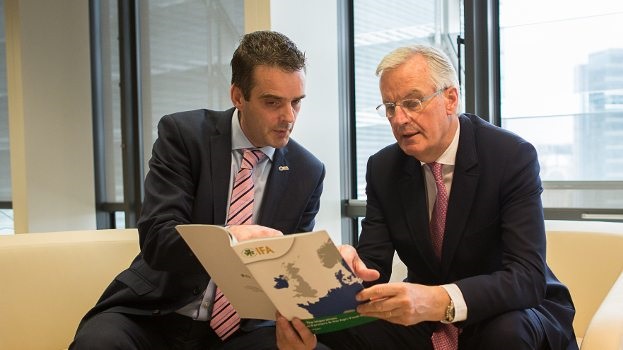
The Irish Farmers' Association (IFA) has dismissed any suggestion of diluting growth targets for the Irish farming and food industry because of Brexit.
Irish farming and the agri-food sector is particularly vulnerable to Brexit due to a high dependence on the UK market, high EU tariff protection applying to major agricultural products and the importance of the CAP budget to farm income – UK being a net contributor.
The land border with Northern Ireland, with the potential to disrupt trade flows, and undermine animal health co-operation, is also seen as a major challenge.
IFA President Joe Healy said: “I expect the Government to redouble their efforts in working to achieve the increase in (Irish) exports to €19bn and the value of primary production to almost €10bn. A successful outcome to the Brexit negotiations will be instrumental in keeping the plan on track.”
IFA will hold a major Brexit event on 24th April. The IFA President said the key priorities for the farming and the food sector are maintaining the closest possible trading relationship between the UK and EU, while preserving the value of the UK market; and a strong CAP budget following the UK’s departure, which is critical for farm incomes, farm output and economic activity in rural Ireland.
Specifically, IFA has identified that, if the UK exits the Single Market and Customs Union, there must be a Comprehensive Free Trade Agreement between the EU and UK.
'Most significant challenge'
Joe Healy said IFA is clear that farming and food must be top of the Brexit agenda, not only in Ireland, but at EU level.
“With 12 million farmers and 40 million related jobs overall, there is a wider strategic objective here to maximise the future value of the EU farming and food sector.”
Joe Healy said the threat of Brexit is the most significant challenge facing the Irish farming and food sector, with 40% of Irish food exports going to the UK.
He said farmers expect the Irish Government to launch a major diplomatic offensive at EU level that places farmers' issues at the heart of the negotiations.
“The implications of a hard Brexit are stark: the ESRI estimates a potential reduction of EU trade to the UK of over 60% for dairy and 85% for meat. Translating this to an Irish context would mean a fall of €1.5bn in meat exports, with dairy exports falling by over €600m.”
IFA’s Project Team led by the President Joe Healy will be undertaking high level contacts with the Oireachtas, Government Departments, the EU Commission and the EU Parliament in the coming weeks. IFA will also be engaging with the wider agri-food sector and with farming organisations across Europe.
